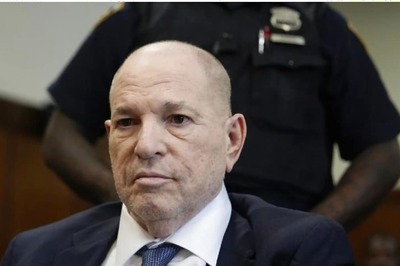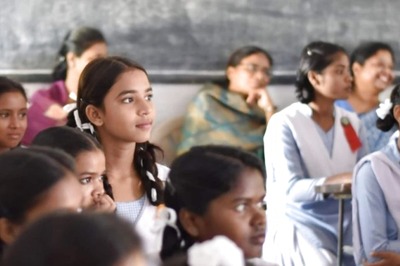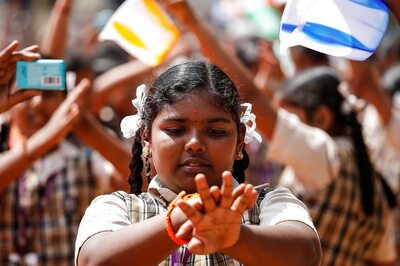Mrinal Sen: The Rebellious Filmmaker Who Made Us Look Into the Politics Behind Our Mundane Existence

views
Mrinal Sen, much like his contemporary filmmaker Satyajit Ray, often addressed poverty through many of his films. But unlike Ray, who portrayed poverty as a tragic burden on human lives, Sen depicted it as a social menace inflicted by class differences. That's what makes Mrinal Sen so unique as a filmmaker — his ability to provide socio-political context to his cinema.
When Sen was eight years old, he was arrested for participating in a protest march. It was perhaps also the same year when he saw his first film, Charlie Chaplin's Kid, which sparked his interest in cinema. Politics and cinema stayed a part of him till he breathed his last today. He never made Chaplin-esque films, nor did he make films on politics. But, all his films were political. Several satires he directed also had an intelligent humour that was his own brand. Here's a look back at some of the best work of Mrinal Sen, who, through his films, poked us to look into the politics behind our mundane existence,and then left most of his films open-ended, because according to him, much like life, cinema's narratives should not come with all the knots tied neatly in the end.
Ek Din Pratidin (1979): Sen puts a magnifying glass on gender imbalance and the way they impact middle-class values in this 1979 film. However, he refers to patriarchy and societal prejudices obliquely and subtly, leaving the audiences open to draw their own inferences.
The story of the film revolves around Chinu and her family, who lives in an old housing complex. One night, Chinu, who is the sole bread earner of the family, doesn't return home from work, pushing all the other members of the family into a mode of panic. While on one hand, they worry what the neighbours would think, and what this would do to their reputation, a bigger fear in them is that of losing the only earning member of the family. Based on a story by Amalendu Chakravarty titled Abirata Chenamukh, Sen's Ek Din Praditin gives an honest insight into the limitations of middle-class values, and how quick people are to make judgements when the person in question is a woman.
Akaler Sandhane (1980): Akaler Sandhane talks about a film within a film. The story begins in 1981 as a film crew lands in a rural village to shoot their film on the 1943's great famine. As they begin, and in the process, get more acquainted with the villagers, they realise that even at a present time, the villagers are suffering from an acute food crisis. The past of 1943, and the present of 1981 merges, as the story moves ahead.
Talking about the film, Sen had said, "As long as we have a sense of historicity, as long as we know the performances and tools that are required in making of a film, we feel very safe. But, suddenly, surreptitiously, stealthily, the past walks into the present, and you have to look into it. You get scared and run away from the reality. That was exactly my plan in Akaler Sandhane."
One of the most remarkable thing about Sen is his honesty, not just to his craft, but also to his audience. Talking about Akaler Sandhane, the filmmaker had very self-consciously added, "In a way, we are exploiting the situation. We cannot do anything about poverty, by making a film, we cannot do anything to the economic structure of society."
The most defining work of Sen was The Calcutta Trilogy which included three films: Interview, Calcutta 71, and Padatik. Sen was exceptionally fond of Calcutta as a city and called it his El Dorado. In one of his interviews, he had once mentioned that when he moved to Kolkata in the 1940's, the immensity of the city horrified him. But, at the same time, he felt involved. The filmmaker said, "Calcutta instigates me, Calcutta settles me, Calcutta makes me cry, Calcutta inspires me." In all the three films, Calcutta features almost as a character, as Sen's film briskly pass the bylanes of the city, with hand-held camera.
The first film in the trilogy was Interview.
Interview (1970): Interview was a film on India's colonial hangover. After the British left, the middle-class Bengali continued with their rituals and traditions, a fact that the protagonist of this film, Ranjit Malik realises after being rejected for a job because he didn't have a suit. Mallik increasingly becomes frustrated with the ways and habitual colonial pretences of the society, and finally, by the end of the film, we see him burst in anger and throw a stone -- as a mark of physical protest -- at a mannequin dressed in a complete suit standing inside a store window.
This film was also unique because of its newness of style. Sen used newsreels, images of the Vietnam war, and the African American movement . He also employed the Brektian style of filmmaking and made his protagonist talk to the audience directly and allowed him to drift into lengthy angsty monologues.
Calcutta 71 (1972): Angry, ruthless and passionate, Calcutta 71 is by far Sen's best work in terms of style and narrative. It is also the most political work of Sen, in which he directly urges to audience to fight poverty. several different story threads, all woven by a common narrator is showed to drive home points against corruption and violence. In Calcutta 71, much like many of his other films, Sen uses his characters not as individuals, but as a representation of certain class, or section of the society. It may sound like a trite creative trope, but in Sen's expert hands, it is anything but that. Sen shows the ugly face of poverty, from dehumanization individuals to eroding their value system to making them susceptible to bullies with mastery and unflinching honesty.
Padatik (1973): Sen had been an upholder of Marxist ideals all through his life, although he was never a cardholder of the party. The filmmaker in this film raises questions about the left movement and all that went wrong in it.
Talking about the film, Sen said, "Padatik has something to do with the contemporary political scene... We had arrived at a point when the Left movement was lying low and the leftist parties were in disarray, losing perspective, and isolated, at a time when there was a need for unceasing self-criticism. That is why the protagonist in Padatik has unshaken faith in the party, even though he has suffered reverses due to faulty direction. Yet he does question the leadership bitterly and uncompromisingly. It is detrimental, ruinous, and suicidal not to discuss these issues at all when you know there is something wrong somewhere, maybe in the cadres, may be in the leadership, or may be somewhere else."




















Comments
0 comment